TCFD
Governance
In Thought and Action: Our Determination to Tackle Climate Change
Our climate action is founded on our Basic Policy on the Environment, which we updated in 2023 to better guide our quest to carry out our Group Purpose, “sustainable growth for more companies.”
Governance Framework
At the Funai Soken Consulting Group, the executive vice president is in charge of sustainability, and final responsibility lies with the CEO. The Sustainability Committee, established in 2021 as an advisory body to the Board of Directors, sets sustainability (defined to include climate change action) targets, monitors progress, and evaluates outcomes. The committee aims to meet three times a year, and the chairperson is appointed by the board. Environmental risks deemed in need of action are reported to the Board of Directors, and necessary measures are determined and implemented.


Strategy
Business Strategy in the Age of Climate Change
To achieve the Funai Soken Consulting Group Purpose—sustainable growth for more companies—we will endeavor to expand our business so as to provide a full spectrum of solutions for SMEs and mid-scale companies seamlessly, and will seek to realize the Group Vision of becoming the foremost provider of digital and comprehensive consulting solutions for mid-scale and SME clients.
Based on our Basic Policy on the Environment, which stipulates that we use our business as a vehicle for good, we strive to make a real reduction in environmental impact, not only within our business activities, but also by using out consulting and other services as a means for working together with clients to address climate change, prevent environmental pollution, and promote recycling.
Risks and Opportunities
To that end, we endeavor to be aware of the impact of risks and opportunities pertaining to climate change, and will carry out the strategies necessary to making sustainability the norm throughout society.
-
Risk
Classification Risk assessment Major action Transition risks Market Increased awareness of climate change and decarbonization throughout society and among clients As concern about climate change becomes widespread, mid-scale companies and SMEs are increasingly shifting toward decarbonization and environmentally conscious management, and we seek to support them on that journey with onsulting services relating to decarbonization and other climate action. Reputation Loss of business due to drop in reputation among stakeholders and lack of accountability Stakeholders are increasingly demanding action on climate change, and reluctance to engage brings the risk of damage to brand and public reputation. Also, the particular urgency of climate concern among younger demographics may cause underperforming companies to struggle to attract workers. Physical risks Urgency Increased risk of economic stagnation due to more severe natural disasters Physical damage to group premises or transport networks would likely impact our ability to provide in-person consulting services. Damage to premises also brings the risk of loss of data (e.g., client data and personal information), so we are working with the Information Security Section and the Risk Management Committee to strengthen systems and infrastructures. -
Opportunities
Classification Risk assessment Major action Opportunities Products and services Offer
environmentally
conscious servicesGrowing interest in sustainability among society, markets, and the group’s clients is expected to boost demand for consulting services. We will offer more climate change conscious, environmentally friendly options among our industry-specific consulting services.
Initiatives Undertaken by Group Companies Funai Consulting
・ Net-zero energy building and housing construction
・ TCFD disclosures, CDP disclosures, science-based targets certification, decarbonization roadmap, carbon neutrality support solutions
・ Management workshops focused on becoming carbon free (membership-based workshops for proprietors and sustainability officers aiming for carbon neutrality in business)
Funai Soken Logistics 💻(in Japanese)

・ Distribute handbook for logistics industry clients on implementing ESG
・ Support for those wanting to adopt ESG into logistics
These risks and opportunities are reported to the Risk Management Committee and the Sustainability Committee described below, for consideration and implementation of appropriate countermeasures.
Initiatives by Funai Consulting
Management Consulting Solutions Pertaining to Carbon Neutrality and Sustainability in Business Management
Funai Consulting offers support for clients hoping to incorporate sustainability into their business administration, These include international initiatives for listed companies (e.g., TCFD compliance, CDP response, SBT certification), and support for mid-scale and larger corporations to make decarbonization roadmaps and greenhouse gas reduction targets.

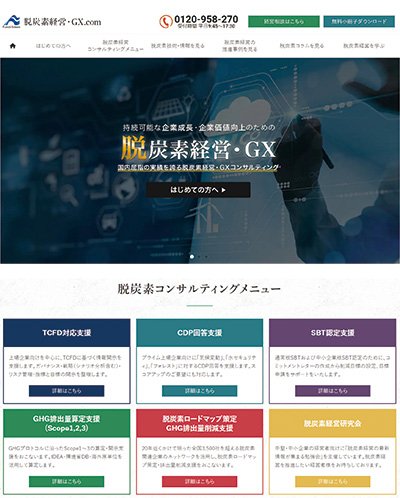
A website (Japanese only) run by Funai Consulting dedicated to solutions for companies that want to decarbonize their businesses. https://shouene.funaisoken.co.jp/
-
Seminars on new business models for the decarbonization market age
Funai Consulting holds industry-specific seminars to help SMEs achieve a carbon-free business. Attendees hear up-to-date information on industry trends arising from the shift toward a low-carbon society, and highly detailed case studies of successful implementation of solutions.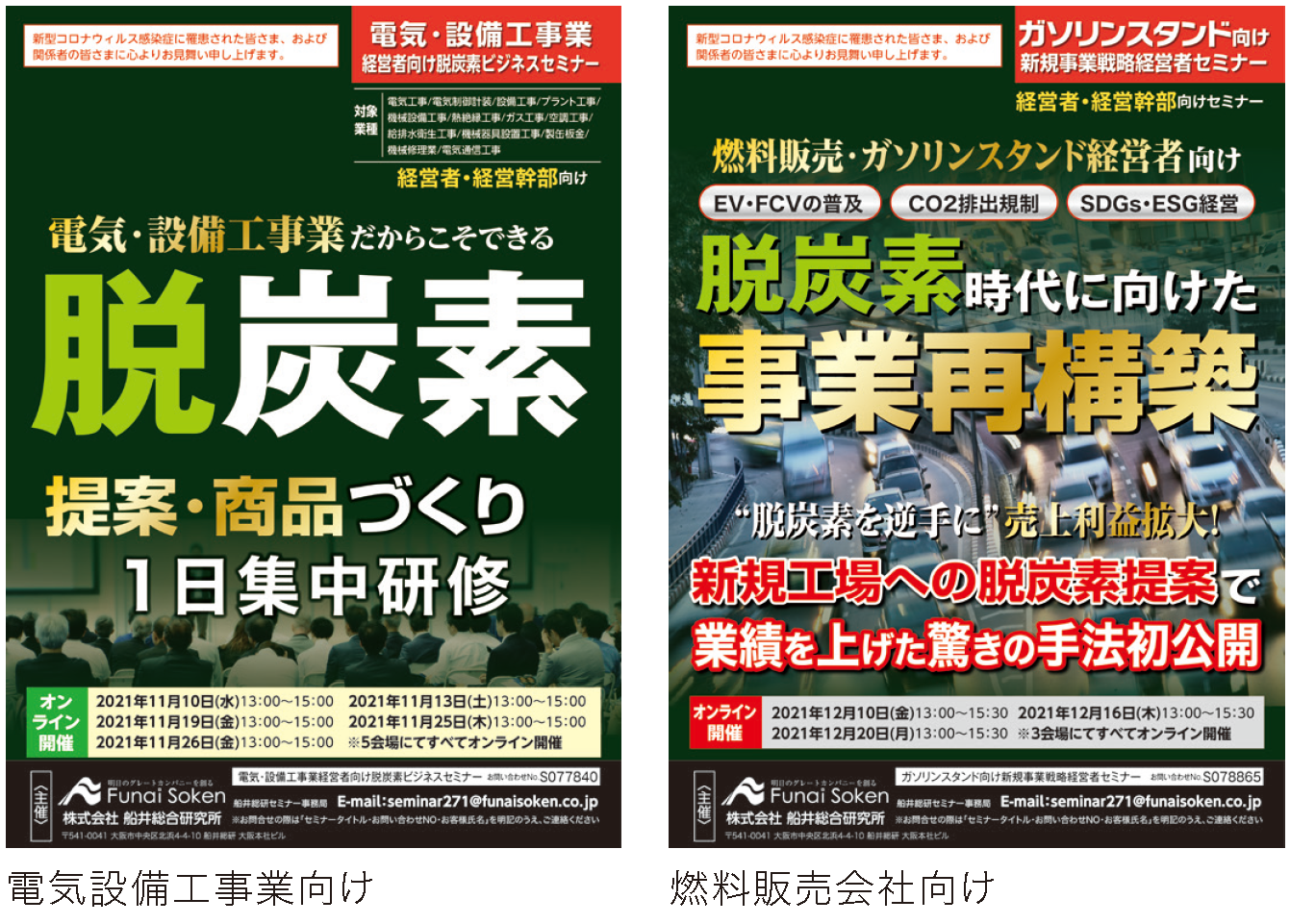
-
Regular Study Workshops to Promote Carbon Neutrality
In August 2022, Funai Consulting launched a management workshop focused on becoming carbon-free. Here, mid-scale company and SME proprietors and sustainability managers can learn about CO2 emission measurement and reduction methods from around Japan through guest speakers, member forums, as well as the latest trends from expert consultants.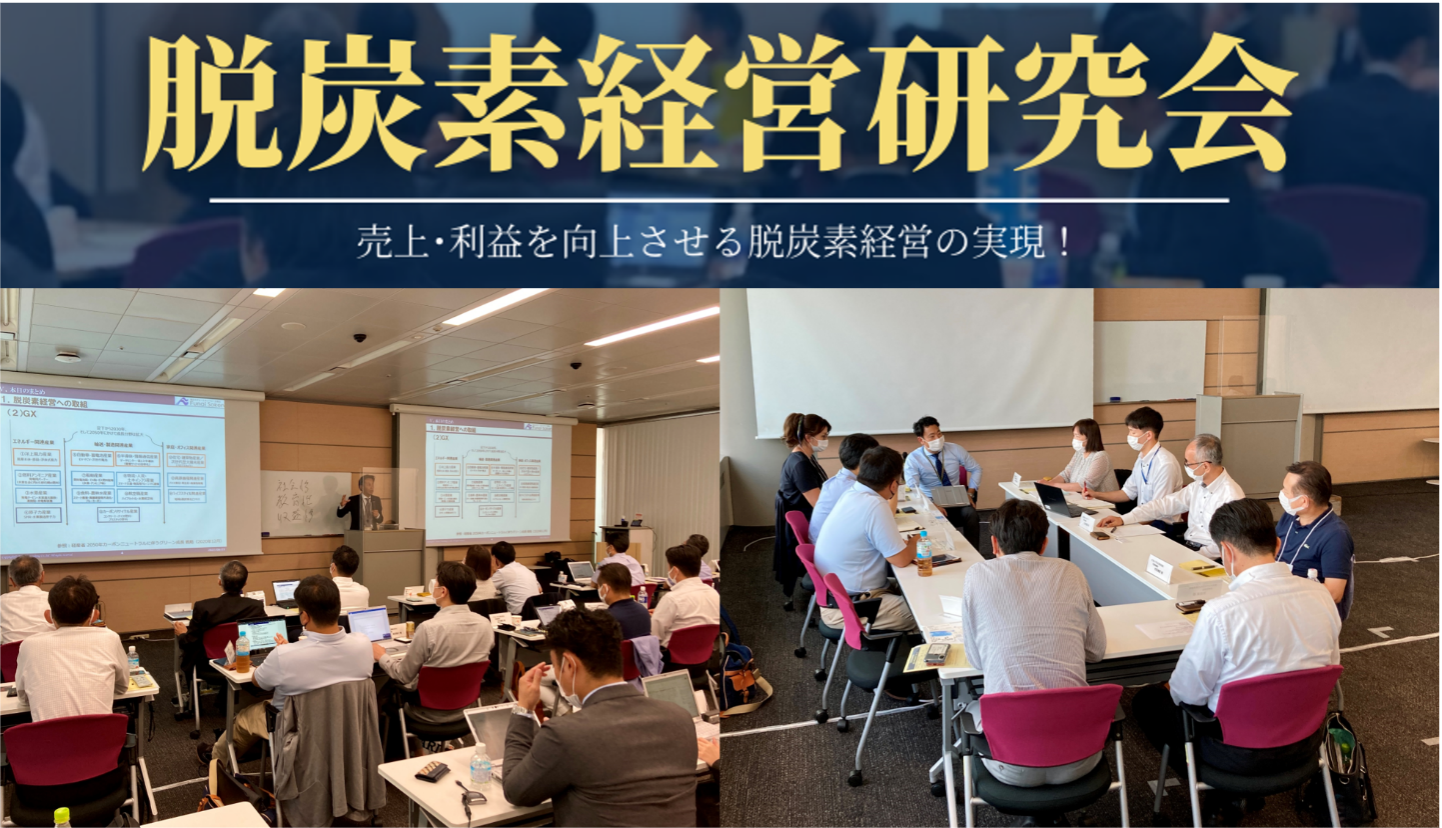
-
Check Out Our Book on Carbon Neutrality in Business Management
In December 2022, Funai Consulting published a book on businesses can decarbonize. Aimed at mid-scale company and SME proprietors and sustainability managers, the book shares helpful knowhow, specific approaches, case studies, and explains the significance of different decarbonization actions.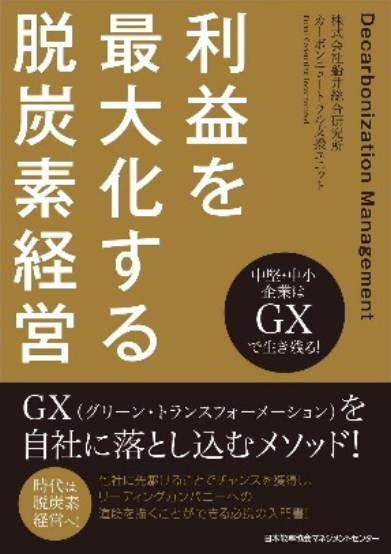
Green Transformation: How Mid-scale Companies & SMEs Can Decarbonize & Maximize Profits
Edited by the Funai Consulting Inc., Carbon Neutrality Consulting Unit
Initiatives by Funai Soken Logistics
ESG Solutions for Logistics Companies and Departments
Funai Soken Logistics offers consulting to help clients incorporate ESG into their logistics to environmental impact and the labor load placed on employees. Specialist consultants use logistics diagnoses to gauge clients’ progress, devise strategies, and provide ESG logistics support.
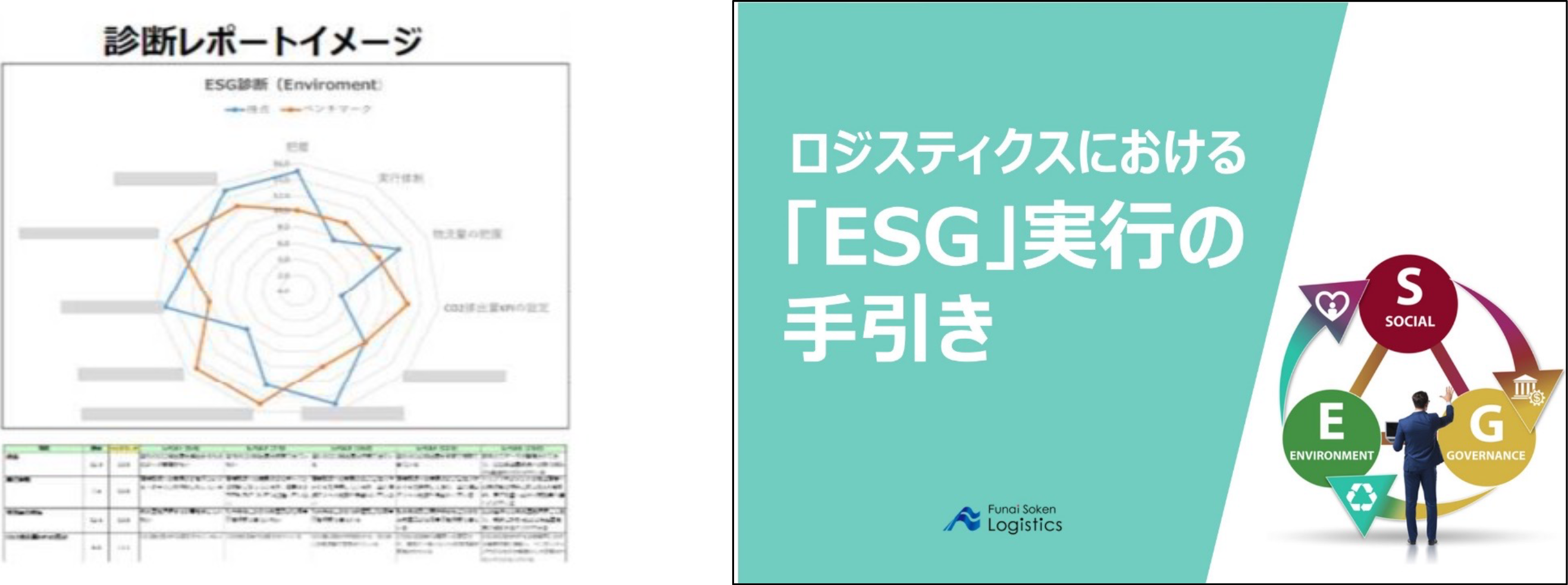
Ongoing Initiatives
In addition to net-zero energy housing and other solutions tailored for clients’ industries, we are working with financial institutions to offer a decarbonization diagnosis service as a means of helping SMEs achieve carbon-free business. We aim to use decarbonization diagnosis as a launch pad for further solutions, such as measurement of greenhouse gas emissions (in accordance with the Greenhouse Gas Protocol’s three-scope system) and creating a roadmap to carbon-free business based on an emissions database and setting out real workplace actions. Also, as part of our management workshops, we intend to establish a new membership-based organization for carbon-free business. At present, the road to carbon-free business is a long and arduous one for mid-scale companies and SMEs, but we are convinced that encouraging them to make this contribution to the public good will surely lead to increased profitability and corporate value.
Risk Management
Tackling Climate Change
Based on our Basic Policy on the Environment, which requires us to disclose information and engage in dialogue, we will strive for continual progress in our environmental initiatives through information disclosure and dialogue with stakeholders.
Management Structure
We recognize the importance of identifying, evaluating, and managing business risks affecting corporate management and business continuity, and the Risk Management Committee implements appropriate measures to deal with these. Meanwhile, the Sustainability Committee is responsible for climate change risk management, and works closely with the Risk Management Committee.
The Sustainability Committee receives reports from the Sustainability Office regarding the results of environmental risk assessments and other risk analyses carried out by the Environmental Management Group, both periodically and in response to internal and external environmental changes, and makes recommendations to the Board of Directors regarding those risks requiring action. Environmental risks deemed to require action are shared with the Risk Management Committee, and the Sustainability Office, which serves as coordinator, reports to the Board of Directors. The board, having considered the connection with other risks, then decides on action to be taken.

Targets and KPIs
The group’s Mid-Range Business Plan (2023-2025) stipulates a sustainability goal of reducing greenhouse gas emissions by 50% compared with 2019 levels.
Quantitative Targets for Fiscal Year 2025

| Emission Reduction Targets and Plans | 2025 | 2030 |
| Scope1 | 50% less than 2019 levels | Achieve carbon neutrality |
| Scope2 | 50% less than 2019 levels | Achieve carbon neutrality |
*We are working on Scope 3 emissions, and will publish these in future.
Reduction Initiatives
Sourcing Renewable Energy
We are aiming for a 100% renewable energy procurement rate at all the group’s Japanese sites by 2030, thereby reducing greenhouse gas emissions to virtually zero and achieving Scope 2 under the GHG Protocol.

-
Reducing Scope 2 Emissions
Electricity ConsumptionIn fiscal year 2021, the ratio of renewable energy procured in our total electricity consumption was approximately 13.4%. As part of our quest to reduce emissions, we are switching our power supply contracts with various suppliers to renewable energy plans. With a view to future membership in RE100 (under the RE Action initiative for smaller-scale users), we will prioritize electricity plans with non-fossil fuel certificates that demonstrate additionality and tracking (limited to renewable energy power plants commissioned within the last 15 years).
Our Policies for Reducing Emissions

*1. Market-based calculation of emissions was made using the adjusted CO2 emission factors of the energy retailers our various business places buy electricity from. Figures for Shanghai are based on Chinese regional grid emission factors.
*2. The year ending December 31, 2019, is the benchmark
-
Reducing Scope 3 Category 1 Emissions
Copy Paper, Seminar DM Printing and PostageOur efforts to make operations paperless continue, and digitalization is a useful means to that end. Mid-to-long term, we will continue to look for more environmentally friendly printing, posting, and transportation options. We will also calculate emissions based on primary data, rather than on a per-unit basis.
*(Reference) Paper Usage (Office Paper) Converted to 4g per A4 sheet
2019 Actual: 35 tons ➔ 2024 Actual: 10 tons -
Reducing Scope 3 Category 6 Emissions
Business Travel at Funai ConsultingDue to the rapid adoption of remote work since 2020 as a measure against the COVID-19 pandemic, there was a downward trend in emissions compared to 2019. Currently, we are maintaining the quality of communication with our customers by appropriately combining remote work and business trips.
Capital Expenditure on Environment-related Initiatives
To create a visual depiction of the effectiveness of the care we take for the environment as part of the Funai Soken Consulting Group’s business activities, we keep tabs on the “shadow costs” of expenditures on environment-related initiatives. As we see it, shadow costs mostly entail installation of “pod” booths in offices to reduce the need for employee travel and, therefore, environmental impact; dual monitors to further promote paperless operations; and developing workshop-related databases to minimize or avoid potential drops in service quality that may otherwise arise when providing services remotely rather than traveling to the client’s premises. Moving forward, we will continue to track these shadow costs as a means of maintaining and improving the accuracy of such visual depictions of environment-minded efforts in our operations.
Major Shadow Costs
・Installation of pod booths in 2024 at Tokyo Headquarters (Yaesu) and Osaka Headquarters: Approx. ¥49 mil.
・nstallation of dual monitors in 2023 & 2024 at above locations: Approx. ¥7 mil.
・Workshop-related database (2018–2025), making management workshop textbooks available for member companies digitally and thus eliminating the need for printed handouts as were previously used: Approx. ¥58 mil.
External Partnerships Aimed at Reducing Pollution, Waste, and Use of Resources
● Signed up to the UN Global Compact (GCNJ) (Apr. 2023)
Through the Funai Consulting Carbon Neutral Team, we participate in two GCNJ working groups—the Environmental Management Working Group and the Working Group on Circular Economy—to gather information and collaborate with external partners.
● Working with a tenant company (a chemical manufacturer) in the same building as our Tokyo Headquarters (Yaesu) on a trial use of reusable drink cups as a possible initiative to reduce environmental footprint and raise awareness of environmental issues among employees
This new initiative comes as part of our efforts to make sustainability a natural, built-in part of business life.
The trial was conducted between October 1 and 30, 2024, with nearly 200 daily users of the cups.
The purposes of the trial were to reduce environmental impact by using fewer disposable cups, raise awareness among group employees about the importance of reusing resources, and gauge (via a questionnaire) the trial’s effectiveness and identify areas requiring improvement.
◾ Cups Used in the Trial

-
About Us
- Corporate Overview
- Vision, Philosophy, Brand Perception
- Officers & Org. Chart
- Our History
- Locations
- Group Companies
-
Investor Relations
- Management Policies
- President's Message
- Mid-range Business Plan
- Corporate Governance
- Financial Highlights
- IR News
- IR Library
- Financial Results
- Summary of Financial Results
- Annual Securities Report
- Integrated Report
- Financial Results Briefing
- IR Calendar
- Stock Information
- Shareholder Returns
- Shareholder Rewards
- Stock Quote
- Our Group at a Glance
